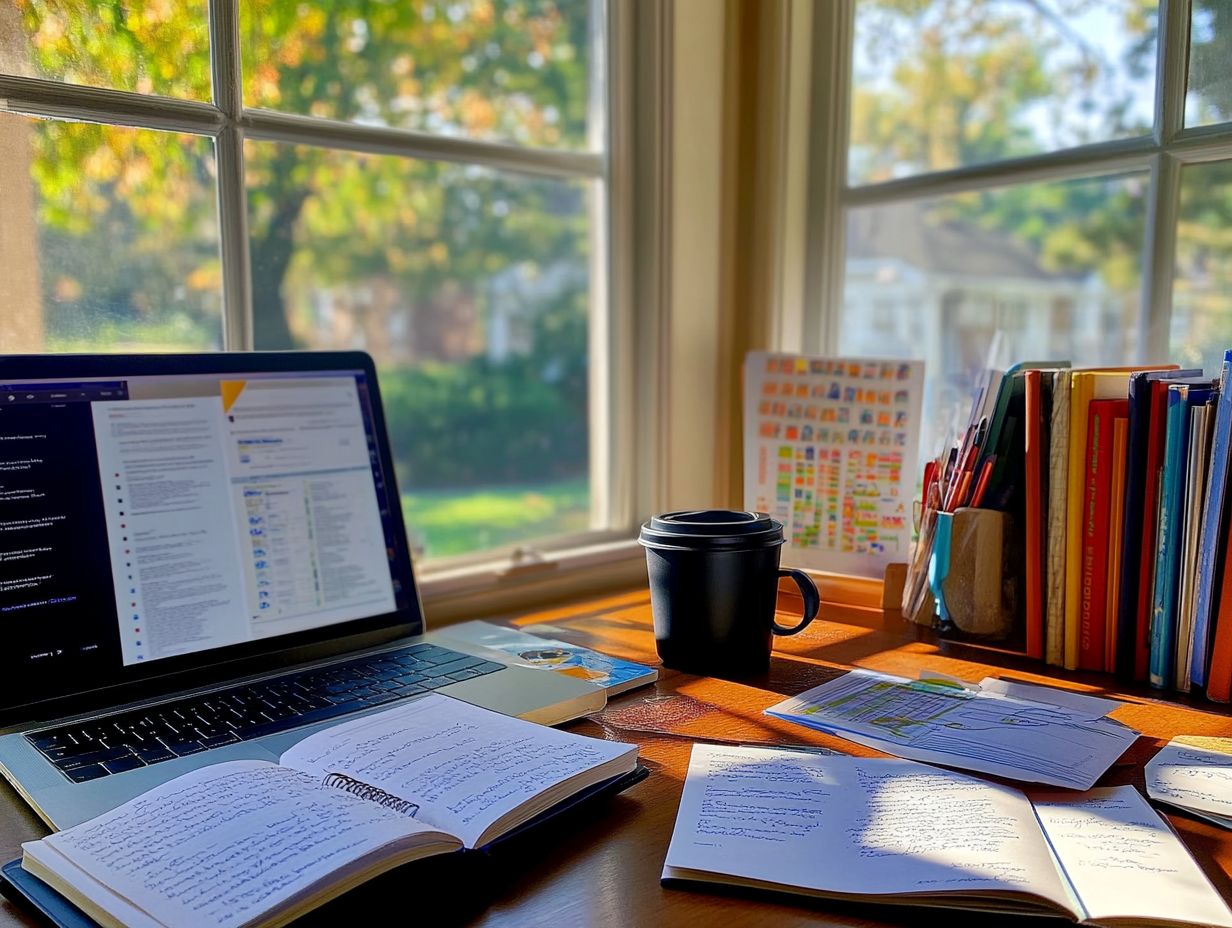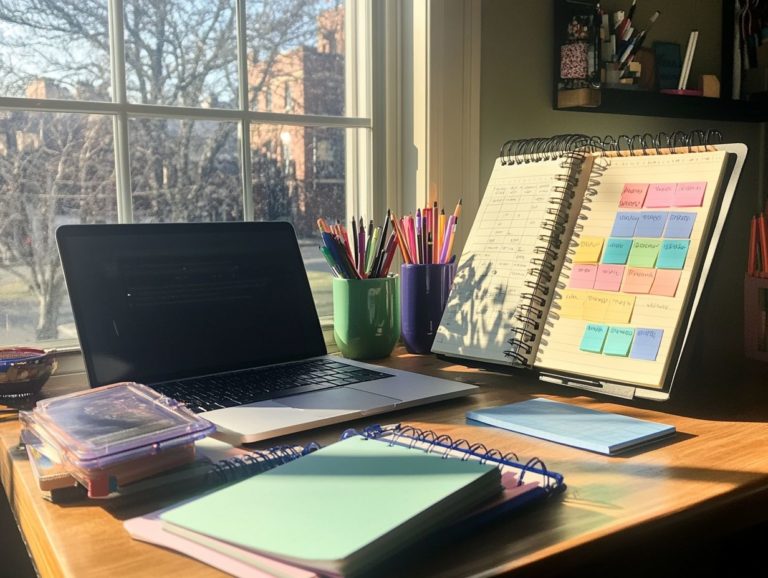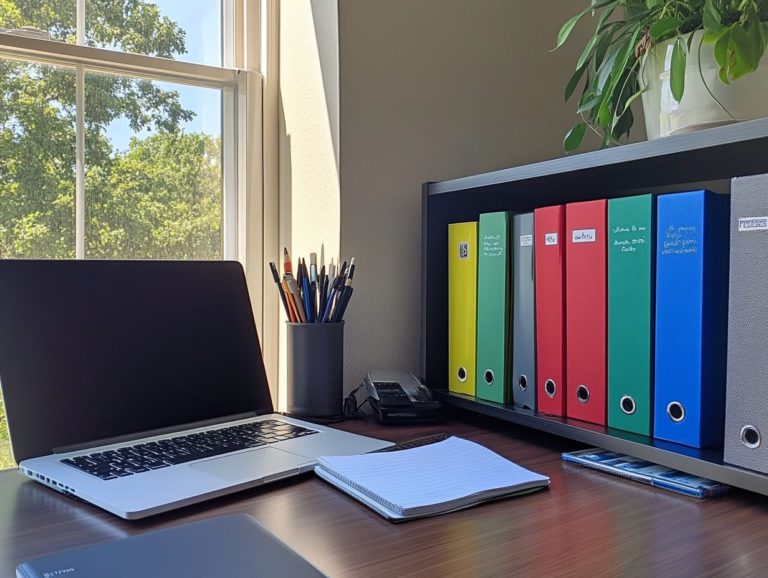5 key elements of effective test preparation
Effective test preparation is essential for achieving academic success, yet navigating this process can often feel daunting.
This article outlines five key elements that can elevate your study game:
- Setting achievable goals
- Crafting a personalized study plan
- Understanding the test format
- Using proven study techniques and resources
- Mastering time management and test-taking strategies
- Prioritizing your mental and physical well-being
Each section provides practical insights and tips designed to empower you as you tackle exams with confidence.
Keep reading to learn how to supercharge your study efforts and ace your test!
Contents
- Key Takeaways:
- 1. Setting Goals and Creating a Study Plan
- 2. Understanding the Format and Content of the Test
- 3. Using Study Techniques and Resources
- 4. Practicing Time Management and Test-Taking Strategies
- 5. Maintaining a Healthy Mind and Body
- Top Study Techniques for Success in Test Prep!
- How Can One Create a Study Plan That Works for Them?
- What Are the Different Types of Test Formats and How Can One Prepare for Them?
- What Are the Best Resources for Test Preparation?
- How Can One Manage Their Time Effectively During a Test?
- Why Is It Important to Take Care of One’s Mental and Physical Health During Test Preparation?
- Frequently Asked Questions
- Why is time management an important element of effective test preparation?
- How can organization improve my test preparation?
- Why is practice essential for effective test preparation?
- How can understanding the test format contribute to my test preparation?
- How can I manage test anxiety during my test preparation?
Key Takeaways:

Clear goals and a study plan are vital for success. Understanding the format and content of the test is essential to focus on relevant study materials. Implementing 5 study techniques to prepare for standardized tests and using various resources, such as flashcards and practice tests, can improve test performance.
1. Setting Goals and Creating a Study Plan
Setting clear goals and crafting an effective study plan is crucial for students. This structured approach streamlines preparation and helps manage time efficiently.
By defining long-term objectives, like aiming for a specific score on a standardized test, alongside short-term targets such as completing a chapter each week, you can easily track your progress.
A well-structured study plan serves as your roadmap, breaking down larger goals into manageable tasks. Journaling your daily study sessions fosters self-assessment, helping you determine which strategies resonate with your learning style.
With consistent reflection based on your feedback, you can refine your methods to align better with your goals, ensuring you stay on track toward achieving academic success.
2. Understanding the Format and Content of the Test
Understanding the format and content of the test is crucial. Familiarizing yourself with the types of questions like multiple choice and true/false can significantly reduce anxiety and enhance your exam performance.
Open-ended questions require a different approach, demanding clear and concise responses. Carefully reviewing the test instructions ensures you grasp what is expected.
Practicing with similar questions boosts your confidence and makes you more comfortable with the format. Addressing common anxieties related to test-taking can also be beneficial.
Techniques like deep breathing and visualization help you manage stress. Breaking the test into smaller sections creates a sense of control, ultimately improving your performance on exam day.
3. Using Study Techniques and Resources
Using effective study techniques for improving test scores and educational resources is essential as you prepare for exams. These tools can significantly enhance your understanding and retention of material, making studying more efficient.
Among the various strategies available, actively remembering information is a powerful method. It encourages you to engage with the material by retrieving information from memory, rather than passively reading or highlighting texts.
When combined with spaced repetition an approach that reinforces knowledge over gradually increasing intervals these techniques can substantially boost your long-term retention.
You ll find many online platforms offering interactive practice tests, allowing you to assess your grasp of concepts in real-time. Resources like Quizlet and Khan Academy provide tailored quizzes for different learning styles, ensuring engaging educational materials are at your disposal.
Try these techniques today and see the difference in your study sessions!
4. Practicing Time Management and Test-Taking Strategies

Practicing time management and test-taking strategies is crucial for students. These skills boost exam performance and reduce anxiety.
By adopting techniques like the Pomodoro Technique, which involves studying in focused bursts followed by short breaks, you can maintain concentration and avoid burnout. Prioritizing tasks based on urgency and importance gives you the power to tackle high-stakes assignments first, setting you up for success.
Pacing yourself throughout the exam is key. Starting with easier questions allows you to score quick wins and build confidence. Simulating exam conditions with practice tests can significantly enhance your familiarity with the format, minimizing last-minute surprises.
Incorporating relaxation techniques, such as deep breathing exercises, can drastically reduce anxiety levels during exams, enabling you to showcase your true knowledge and capabilities.
5. Maintaining a Healthy Mind and Body
Maintaining a healthy mind and body is essential during exam preparation. Adequate sleep, balanced meals, and a positive mindset can significantly reduce stress levels and enhance focus.
Quality sleep is foundational for success. It allows your brain to process information and improves memory retention. Nutrition also plays a pivotal role; a nourishing breakfast fuels cognitive function and provides the energy needed to kickstart your day effectively.
Incorporating mindfulness practices and physical activity into your routine can help manage stress and enhance concentration. Regular exercise not only lifts your mood but also creates a more dynamic learning environment.
By making these healthy lifestyle choices, you foster a constructive mindset, enabling you to tackle challenges with confidence and achieve your academic goals.
Top Study Techniques for Success in Test Prep!
The most effective study techniques for test preparation involve a rich tapestry of methods designed to cater to your unique needs. Understanding the key components of test preparation ensures you engage deeply with the material and retain information through structured practices and valuable resources.
Among the most impactful strategies are active recall, summarization, and spaced repetition. Flashcards can be an incredible tool for active recall, allowing you to test yourself on key concepts instead of merely skimming through notes.
For example, summarizing chapters in your own words not only cements your understanding but also highlights essential points. Incorporating spaced repetition into your study routine can significantly enhance memory retention by revisiting flashcards and key information at gradually increasing intervals.
Create a personalized study plan that aligns with your learning style whether you re a visual, auditory, or kinesthetic learner to optimize your study sessions and achieve better outcomes.
How Can One Create a Study Plan That Works for Them?
Creating an effective study plan requires a personalized touch that embraces goal-setting, self-assessment, and the cultivation of strong study habits tailored to your unique learning style and needs.
Begin by pinpointing your specific academic objectives. This allows you to customize your study sessions to concentrate on areas that demand the most attention. Focus on mastering key topics and ace those upcoming exams!
Next, assess your current knowledge gaps. This reflection reveals which concepts need further exploration, enabling you to engage in targeted learning.
Establishing a routine of regular study sessions whether daily or weekly ensures consistent progress. Incorporating self-assessment techniques, such as quizzes or reflective journaling, provides valuable insight into your development over time.
Lastly, embrace flexible study habits, like adaptable study blocks that adjust to last-minute obligations, allowing you to maintain depth in your learning without sacrificing outcomes.
What Are the Different Types of Test Formats and How Can One Prepare for Them?

Understanding different test formats, like multiple choice and true/false questions, is crucial for tailoring your preparation strategies and maximizing your performance.
By grasping the nuances of each format, you can pinpoint which study methods will boost your skills while addressing any potential weaknesses.
For instance, when preparing for multiple-choice exams, practicing with sample questions and strategizing how to eliminate incorrect options can be invaluable.
True/false questions often require a deeper understanding of the material rather than simple memorization. Creating flashcards with key concepts can significantly improve your retention.
Adapting your study techniques, such as incorporating practice tests, can greatly enhance your comprehension and confidence, leading to better exam outcomes.
What Are the Best Resources for Test Preparation?
The best resources for test preparation include various educational materials and practice tests tailored to your learning needs.
Utilizing a blend of textbooks, which offer in-depth knowledge, and online courses that provide interactive experiences can enhance your understanding.
Engaging in forums allows you to connect with peers and mentors, exchanging tips and strategies that can elevate your preparation.
Mobile apps also play a key role, offering practice tests and flashcards that make studying convenient and accessible.
Mix these resources into your study routine for better results!
How Can One Manage Their Time Effectively During a Test?
Managing your time during a test is an essential skill that gives you the power to navigate questions with ease and minimize anxiety.
To sharpen this skill, set specific time limits for each part of the exam. This helps maintain focus and stay on course.
Using a watch to track your progress offers a concrete way to monitor pacing and prevents lingering too long on any single question.
Practicing under timed conditions boosts comfort and confidence, allowing you to acclimate to the pressure of a ticking clock.
Incorporating these techniques into your preparation can transform an overwhelming experience into a manageable approach, paving the way for better outcomes.
Why Is It Important to Take Care of One’s Mental and Physical Health During Test Preparation?
Taking care of your mental and physical health during test preparation is essential, as it influences your ability to focus and manage stress, which are key signs of effective test preparation.
Prioritizing your well-being lays a solid foundation that enhances cognitive function and emotional stability.
Regular exercise boosts your energy levels and gets you ready to tackle your studies! Meditation provides tools for calming your mind and reducing anxiety.
Proper sleep hygiene is crucial; restorative sleep boosts memory consolidation and helps maintain a balanced mood.
By focusing on your health, you ll be more prepared and confident for those big exams!
Frequently Asked Questions

What are the 5 key elements of effective test preparation?
The 5 key features of quality test prep programs include time management, organization, practice, understanding the test format, and managing test anxiety.
Ready to ace your exams? Start your preparation today!
Why is time management an important element of effective test preparation?
Time management is vital. It helps you allocate your study time wisely and focus on areas that need improvement. It also prevents cramming and burnout before the exam.
How can organization improve my test preparation?
Being organized keeps you on track. It prevents you from forgetting important topics and allows you to create a study schedule. Stick to it for more efficient test preparation.
Why is practice essential for effective test preparation?
Practice is essential. It helps you understand the test format and find weak areas. Additionally, implementing 5 study habits to improve test performance builds your confidence, which is key for performing well on the actual test.
How can understanding the test format contribute to my test preparation?
Knowing the test format helps you adjust your study strategies. You can focus on the types of questions that will be on the exam. This knowledge reduces anxiety and improves your performance.
How can I manage test anxiety during my test preparation?
You can manage test anxiety in several ways. Practice relaxation techniques and create a positive study environment. Focus on your strengths and positive outcomes!
Start preparing today to ace your test!





